I recently had the good fortune to tap into the vast experience of one of the world’s foremost experts on budget and solo travel. Over the past two decades, Nomadic Matt has backpacked his way through over100 countries and territories with a carry-on travel bag. He knows a thing or two about packing light! In this interview, he shares some of his top packing tips.
Who is Nomadic Matt?
Matthew Kepnes is an internationally recognized authority on budget travel. He’s also a successful travel blogger. Conduct a search of top travel blogs, and you’ll undoubtedly find Matt consistently occupying a spot in the top ten.
He’s also written a New York Times bestseller, How to Travel the World on $50 a Day, and several country-specific and city-specific travel guides.
Through partnerships with technical experts, he’s developed four courses: A to Z Guide to Travel Writing, The Business of Travel Blogging, a photography course called How to Capture the World, and The Art of Travel Vlogging.
My connection with Nomadic Matt
What does an accomplished blogger do in his spare time? He creates tools for those interested in following in his footsteps. When I decided to venture down the blogging path, it seemed like a no-brainer to learn from an expert. That’s when I enrolled in The Business of Travel Blogging course. I was impressed with Matt’s journey as a blogger. He’d built a successful online business without any prior business or website knowledge. But more importantly, the proof was in the pudding. His site was one I wanted to emulate: no distracting advertisements, an absence of endless reviews from sponsored trips, and no sponsored posts flogging yet another travel product or service.
I appreciated that Matt was able to build a successful relationship with his readers by consistently delivering great content. So when I had the chance to obtain Matt’s insights on packing and travelling light, it was too good an opportunity to pass up.
Packing tips from Nomadic Matt
Thank you Matt for agreeing to share packing tips with readers interested in refining their approaches to packing light, and perhaps aspiring to travel with carry on.
What advice do you have for travellers who are grappling with the challenge of packing light?
I think over packing is something pretty much everyone does when they start travelling. We all want to be prepared so we bring every single piece of clothing we have — “just in case.” Yet, nine times out of ten, we never even use most of what we bring. Humans have a tendency to fill empty space, so if you have a 60-litre backpack, chances are you’re going to fill it. So, if you want to pack light, you need to bring a smaller bag!
Unless you need a lot of winter clothing for your destination, a 40-litre bag and a day bag are all you need for most trips. Having a smaller bag will force you to make cuts to your travel packing list and prioritize the things you need. I know it can be challenging at first. But when you have to carry your bag everywhere you go, you’ll learn to appreciate that when it comes to packing, less is more!
Why 40-litres? And besides, what are your main reasons for packing light?
A 40-litre travel backpack, for me, marks that sweet spot where you can fit all the essentials (clothing, toiletries, electronics) and still be suitable as a carry-on bag when flying.
Travelling with carry on means you don’t have to wait for your luggage at baggage claim. It also guarantees that your bag never gets lost in transit. Avoiding those two headaches alone is worth it if you ask me!
On top of that, with a 40-litre bag and a small day bag you can easily travel around on foot without your stuff being too heavy. If you’re on a budget and plan on walking and taking public transportation, carrying less is going to save you time, energy, and headaches. In my experience, the 40-litre bag gives you the best of both worlds.
What do you look for in a day bag? Do you have a personal favourite when it comes to type or brand?
I’m much less picky about day bags than I am about my main bag, since I’m never spending as much time with them. As long as it has a water bottle holder, a slot for my laptop, and a few smaller pockets for things like maps and snacks, then I’m happy. Having enough padding on the shoulder straps is an important consideration as well, since you’ll end up wearing it for hours at a time. But there’s no need for a hip belt or waterproofing since you can just buy an umbrella or small rain cover for it.
At the end of the day, just make sure you try your day bag on a few times before you buy it. You don’t need to invest as much time or energy when compared to buying your main bag. But since you’ll be using it a lot, you do want to find something that fits well and has a set-up that you like.
My guess is you didn’t start out having all the answers when it came to packing, and there were lots of learning moments along the way. If so, what are a few of your worst packing mistakes, or realizations that informed your packing style today? It might be a comfort to travellers to realize that they don’t need to have all the answers starting out.
I definitely didn’t have all the answers when I started! I overpacked often, lugging around all sorts of things I barely used. Planning a trip can be challenging, and I packed too much clothing when I started. I wanted to have something for every occasion “just in case.” I’d also lug around things I’d rarely use (like umbrellas) instead of just buying one if I needed it. I was over prepared on the packing front, to the point that it was an inconvenience.
For the most part, the places you visit will have everything you need. Don’t bring your entire wardrobe when you travel. If you need another shirt, buy it at your destination. Don’t bring five pairs of shoes —buy a pair if you happen to need extra. Sure, it may cost a few bucks more but saving all that weight will add up, especially if you’re on a longer trip and have to carry your bag everywhere.
Besides your passport, financial cards/cash, emergency medical insurance, toiletries, first-aid kit, and the clothes on your back, what are some “must-haves” you pack for every trip?
If I had to pick three things, they would be:
- A travel towel. It’s an awesome multipurpose item. It can be used as a picnic blanket, beach towel, pillow, curtain for your dorm bed, and more! I never go anywhere without one.
- My notebook. I’m always writing down ideas and notes for work, so having a notebook on hand is important. I usually don’t blog about my travels during my trip. Being able to take notes is important for when I sit down to actually write about my travels.
- My phone. It’s home to my maps, my communication, all my booking information, offline language pack, and all the apps I use to get the most out of my trip (particularly sharing economy apps). Plus, it’s my camera these days, since I don’t travel with a larger one.
What are some examples of items you’ve packed that were hands-down the most important thing(s) you packed for a particular trip?
Having offline access to maps as well as the local language has proven invaluable time and time again. Downloading these to your phone via Google Maps or Google Translate before your trip will give you some peace of mind as you set out on your adventure. In a pinch, you can use the translate app to ask for help, find your bus stop, or read street signs as you look for your accommodation.
Working in tandem with that is having access to offline maps, since you might not have data or Wi-Fi access while you’re on the road. I’ve been lost on countless occasions, and the combination of these two offline programs saved the day. Definitely download them before your next trip!
Have you ever fallen prey to pickpockets? How do you protect yourself? What anti-pickpocket gear or strategies do you have when travelling to areas where pickpockets are active?
I haven’t been pickpocketed, fortunately. It’s rather surprising when I think about all the places I’ve been where it could have occurred! But, I try to stay aware of my surroundings when I travel, being careful to never flash money or valuables in public. I also make sure I never leave my drink unattended, and that I don’t ever walk around at night drunk. I keep extra debit and credit cards in my main backpack, just in case my regular ones get lost or stolen while I’m out. And I always keep a backup of cash in my bag for emergencies. That way, if I do get robbed or lose my wallet, I’m not in such a dire situation.
To top it all off, I make sure I always buy travel insurance. I’ll document my valuables (phone, laptop, etc.) before I depart and email a copy of that information to myself. That way, if I need to make a claim after being robbed I have all the information saved in my inbox and can submit that to the insurance company easily. So far, I haven’t had to do that but it’s better to be safe than sorry!
You’re a top blogger in the travel space, where decent photos are key. How have you reconciled the need for a decent camera, while being committed to packing light? For those of us who aren’t, or don’t aspire to be professional photographers, what advice do you have on a decent lightweight camera, or the features to look for?
I’ll be the first to admit that photography isn’t my strong suit. I’ve built my website around information more than photography, so I usually just travel with my iPhone. Getting professional-level photos isn’t something I necessarily need to do. Most smartphones actually have pretty reliable cameras these days. For your average trip, they will be perfectly fine. Google’s Pixel 2 and the iPhone X both have impressive cameras. They won’t disappoint when it comes to travel photography.
If you want something a little more versatile, expect to spend $200-500 on a solid point-and-shoot camera, like something from the Canon Powershot series. Those take up little room and will give you great pictures. Plus, if you learn some travel photography tips then a basic camera will be all you need!
Conclusion
Whew! Thank you, Matt. That’s a lot of great information you’ve “packed” into this short interview.
Looking for more ideas? If so, these related posts might help:
- Top 20 tips on how to pack light
- 33 Features of a perfect carry-on bag: buying guidelines
- 14 Best standard carry-on bags according to travel bloggers
- 22 Best personal carry-on bags according to travel bloggers
- Stop pickpockets with an assortment of anti-pickpocket gear
For reliable advice on how to travel better, cheaper, longer, and smarter, check out Nomadic Matt’s Travel Site. If you’re an aspiring blogger looking for a course with full technical support (rare in a blogging course), take a look at The Business of Travel Blogging. I highly recommend it.
If you found this post helpful, please share it by selecting one or more social media buttons. What do you think of these packing tips from Nomadic Matt? Please add your thoughts in the comments. Thenk you.
Care to pin it for later?
Some of the links in this post are affiliate links. This means that if you use one to buy something, it won’t cost you more but this site earns a small commission that helps with site maintenance costs. So, thank you.
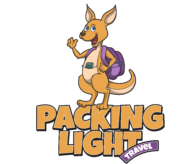
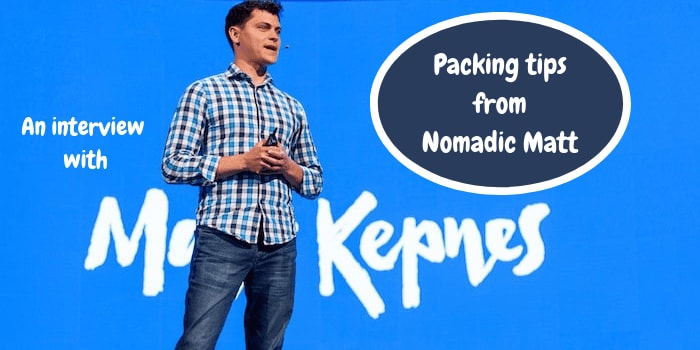
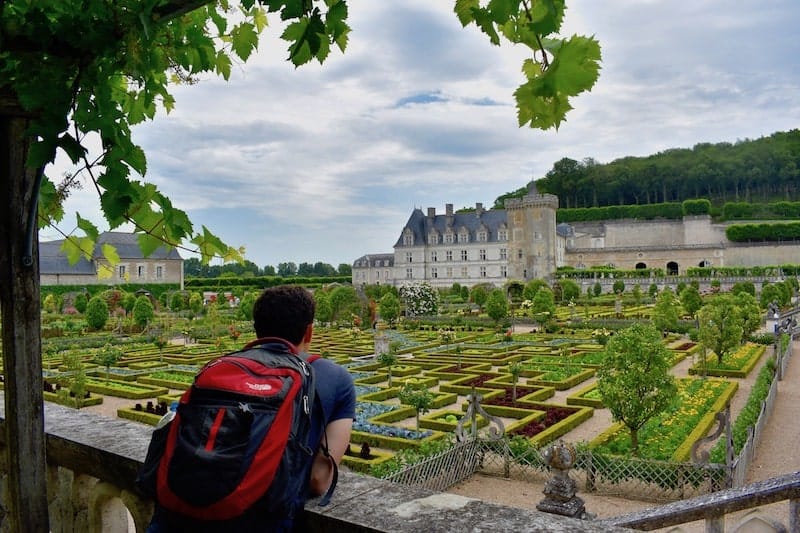
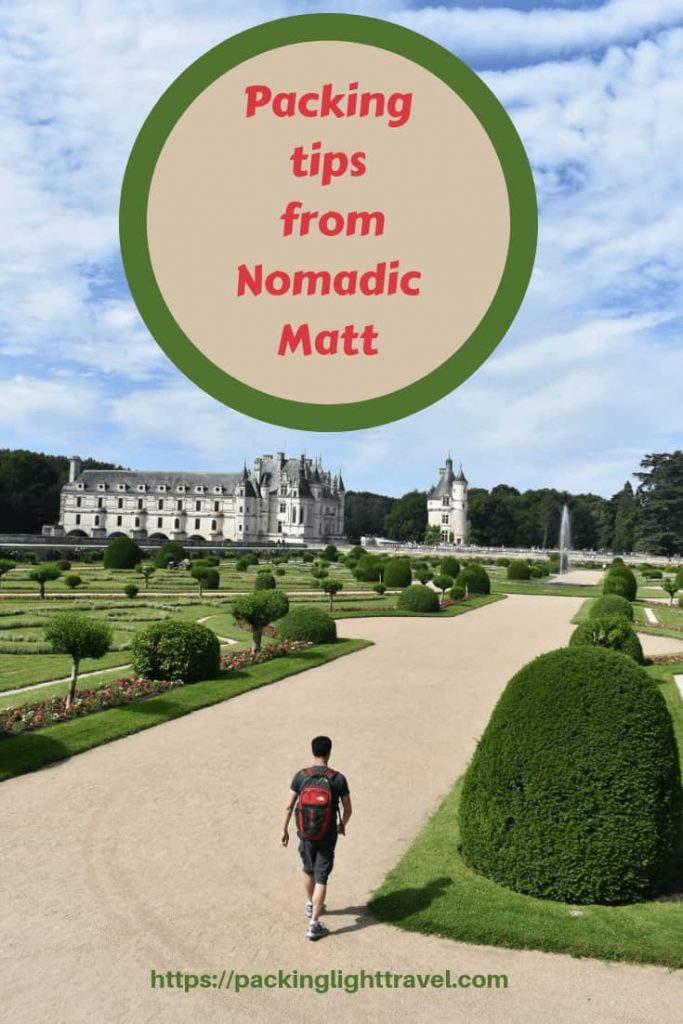
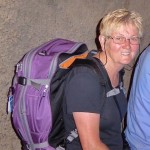
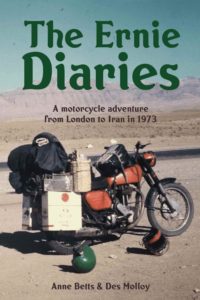
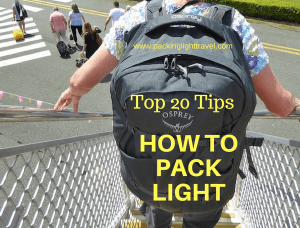

Great article, Anne! There are a lot of great travel tips. Experience counts!
I totally agree that when travelling weight is everything so if you can reduce the weight of your camera or get yourself a lighter one if would save you weight and even cash as relates to excess luggage costs.
As always, Nomadic Matt is on point. I’m a huge fan of him and an inspiration.